In this episode of Trust Me Mom (Season 2, episode 33), Ekaterina Konovalova sat down with Vanessa Spinarsky - registered social worker, content creator, and one of the most honest voices in modern motherhood.Vanessa shared her personal story of loss of her father, what led her into social work, and how motherhood shook her sense of identity. Together, we unpacked the reality of postpartum burnout, the pressure and “surveillance” moms feel on social media, why it’s normal to not enjoy every moment, and how shame gets projected in parenting spaces. We also dove into the mental load, inequality at home, and what partners can do that actually helps: acknowledge reality without debating it.To learn more about Vanessa, check her website https://linktr.ee/vanessaspinarsky00:37 — Meet Vanessa Spinarsky 01:10 — Why Vanessa became a therapist: early creativity + psychology02:40 — Losing her dad at 8 and how it shaped her inner world05:46 — “Motherhood rocked me”: identity crash + anxiety07:20 — Social media “surveillance” and moralized motherhood10:24 — The daily grind: “getting back to zero” and burnout10:56 — The “strong one” identity + postpartum vulnerability13:35 — What progress in motherhood really looks like: adapting15:16 — Guilt, overstimulation, and not enjoying every moment16:01 — Why stepping away can be loving (and not “abandoning”)20:58 — Shame: internal vs projected judgment (comment sections)24:21 — Mental load + inequality: shift from blame to acknowledgement29:38 — Lessons from her husband: letting go of control + embracing rest33:25 — Vanessa’s book journey (proposal + what’s coming)35:38 — Nervous system flexibility: micro-rest and realistic regulation40:23 — Why you can’t “switch back” to pre-kid life overnight40:30 — Final thoughts: co-regulation, “me too,” and feeling seen#TrustMeMom #VanessaSpinarsky #Motherhood #Postpartum #MomBurnout #MentalLoad #WorkingMoms #Parenting #GentleParenting #MomShame #Matrescence #NervousSystem #EmotionalRegulation #MarriageAndParenting #WomenSupportingWomen


